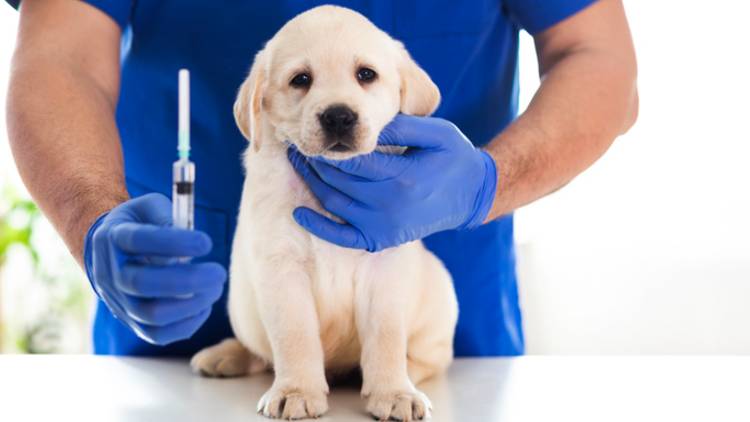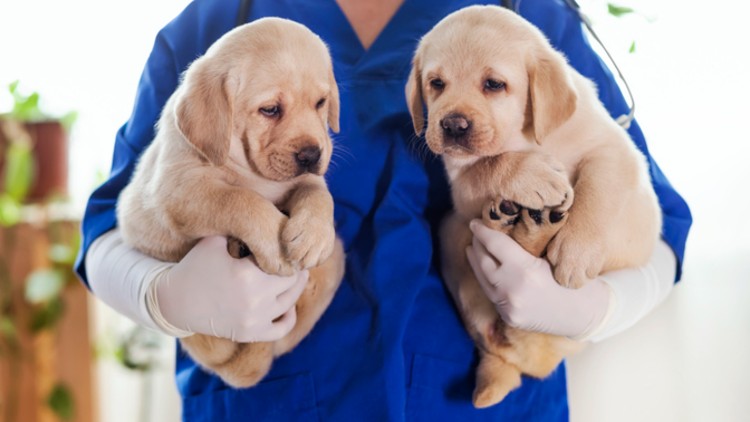A vet’s guide to puppy shots
From when to vaccinate to what puppy shots are needed

One of the first steps in setting your puppy up for success is making sure they get their puppy shots, also known as vaccines.
Welcoming a new puppy into your home is an exciting time. From veterinary care to puppy supplies, ensuring your new puppy has everything they need can be a daunting task. Alongside selecting the best puppy food for your new canine companion, researching veterinarians and getting the right pet insurance for you, puppy vaccinations are an essential part of any puppy checklist, and you should look to understand your new pet’s veterinary needs from the outset to set them up for a healthy and happy life.
This article will provide you with an in-depth guide to getting your puppy vaccinated. It will answer the common questions new owners have and provide you with the information that all dog owners need to know.
When are puppy shots needed?
Your puppy should receive their first shot around 8 to 10 weeks of age. After the initial shot, your puppy will need a set of booster shots every 2 to 4 weeks until they are 16 weeks of age. In most cases, this means your puppy will get vaccinated at 8 weeks, 12 weeks, and 16 weeks of age. These recommendations may vary depending on your veterinarian, the health status of your puppy, and any previous medical care.
Whether you get your dog from a breeder or a shelter, make sure you ask if your puppy has already received any vaccines. If they were vaccinated, obtain copies of the medical records to determine when the shots were given and which shots they received. In some cases, the vaccination status of the puppy is unknown. In this scenario, it is best to assume that the dog has not received any vaccines. Regardless of age, if the puppy has not been vaccinated they will need to get booster shots 2 to 4 weeks following the initial set of shots.
Puppy shots do not provide lifelong immunity. Your dog will need to stay up to date on vaccines throughout the rest of their life. After the initial puppy shots, a booster is required when your dog turns a year old. Some vaccines will need a booster shot every year. Other vaccines may only be necessary every three years.

What puppy shots to get
Shots are categorized into two groups, core and non-core vaccines. Core vaccines are the ones that all puppies should receive. Core vaccines include:
Get the best advice, tips and top tech for your beloved Pets
- Canine distemper virus
- Canine adenovirus
- Canine parvovirus type 2
Non-core vaccines are shots that are not recommended for all puppies but may be recommended under certain circumstances. Some non-core vaccines include:
- Leptospirosis
- Rabies
- Bordatella
- Canine Influenza
Whether or not your puppy will need a non-core vaccine will depend on certain risk factors. The puppy's lifestyle and where you live will play a major role in this decision.
For example, rabies is currently not considered a core vaccine for pets in the United Kingdom because rabies is not found here. However, if you plan on traveling outside of the country with your pet, rabies vaccination may be necessary. Your veterinarian can help you determine what vaccines are appropriate for your puppy to keep them healthy and safe.
Where to get puppy shots

There’s no NHS for pets. Veterinary care can be eye-wateringly expensive and most pets will need treatment for an illness or injury at some point in their life. It’s difficult to think about your animals being hurt or unwell, but you need to ask yourself: what would you do if you were faced with a vet bill for hundreds or thousands of pounds?
You should make an appointment with your local veterinarian to get your puppy's shots. Having a veterinarian administer the vaccines is necessary for many reasons including, ensuring your puppy is healthy and determining which vaccines are appropriate.
Before giving the shots, your veterinarian will perform a physical exam to assess your puppy’s overall health. If you have any questions or concerns about your pet’s health, this is a great time to address them.
Although most symptoms are relatively mild, adverse vaccine reactions can happen. Your veterinarian can discuss what to look for and treat your dog if any adverse reactions occur. This is another crucial reason to establish a relationship and make sure a veterinarian administers your puppy’s shots.

How much will puppy shots cost?
The cost of puppy shots varies between veterinary clinics. According to the Royal Veterinary College, you should expect to pay around £35 per vaccine visit. The total cost of vaccines may increase based on your puppy’s risk factors and what non-core vaccines are necessary. Some clinics offer wellness plans that have monthly payments. Wellness plans typically include shots and other preventative care.
Having a puppy is a financial commitment that is not to be taken lightly. Although these shots may seem expensive, treating your dog for the diseases that these shots protect against is significantly more costly. The cost of vaccinations is a small price to pay to ensure your pet's long-term health and safety. Before bringing a puppy into your home, make sure you understand the costs. If you have additional questions about the cost of making a puppy a part of your family, talking to your local veterinarian is a great place to start.
Summary
New puppies come with a long list of things you need to learn to provide them with the care they need. Making sure your puppy is healthy and protected from disease should be a top priority.
Puppy shots are a vital part of developing your puppy’s immune system. Healthy immune systems are necessary for your dog to live a long and healthy life. By understanding puppy shots, you can ensure you are providing your dog with the protection they need. Establish a relationship with your local veterinarian and make sure your puppy gets the appropriate shots and veterinary care.
Dr. Elizabeth Racine is a small animal general practice vet covering all things pet health and wellness. Her special interests include veterinary behavior, nutrition, and internal medicine.
As a freelance writer, Dr. Racine has written content for major companies in the industry such as the American Kennel Club, Merck Animal Health, Bayer PetBasics, Elanco, and CareCredit. In her free time, Dr. Racine enjoys playing trampoline dodgeball, hiking with her beagle Dasher, and spending time with her three mischievous cats.

